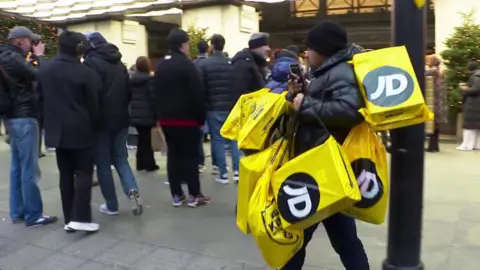 EVN/BBC
EVN/BBCFootfall data suggests Boxing Day shoppers are moving away from the High Street and shopping centres, compared to last year.
Footfall on UK high streets was down 9.6% from 2023, while shopping centers saw a 5.1% drop in visitors, as of 20:00 GMT, data collected by MRI Software showed.
The provisional figures are an early sign that online shopping still dominates traditional Christmas sales.
Although many stores are still expected to see business on Thursday, major retailers such as John Lewis, M&S and Next have chosen not to open the majority of their stores, saying they want to give their staff a break over the festive period.
One of those out shopping on Boxing Day, Lorna, was bargain hunting with her mother and sister in Liverpool.
She told the BBC that this year is the first time she has decided to go out a little late, arriving in Liverpool’s shopping district at 10:30.
She said: “My mother and I come every day. We usually wake up and stand in line at five in the morning, and we have been here every year for 10 or 15 years but this is the first time we have been late.”

Another Liverpool shopper, Dave, joked that although he wouldn’t generally be out shopping on Boxing Day, he had struck a deal with his wife.
He said: “I will go shopping with her and she will come with me to the Liverpool match.”
Data so far suggests in-store visits are 20.5% below pre-pandemic levels.
Overall Boxing Day activity levels were down 7.6% across all UK retail destinations, as of 20:00, compared to 26 December last year.
Analysts told BBC News that brick-and-mortar stores were becoming less profitable because keeping them open was expensive due to rising energy costs and, for some, overtime pay for staff during the bank holiday.
Online stores are cheaper to operate and incur lower overhead costs.
Jenny Matthews, from the MRI programme, said an annual rise in visitors was expected from December 27.
But she added that this year’s drop in shoppers on Christmas Day was a “big contrast” to 2023, when the number of shoppers until 5pm was almost 3.3% higher than the previous year.
“This may be a reflection of a shift in consumer behavior affected by the ongoing cost of living crisis,” she said.
Sales volumes at clothing stores recently fell to their lowest level since January 2022, according to ONS figures, with retailers saying economic factors were to blame.
UK retail parks, which often offer free parking and are more suitable for larger shops, fared slightly better, seeing just a 6.1% decline in visits compared to last year.
In many ways, Boxing Day is no longer the major shopping event in itself, as it was in the past.
Many retailers start their online sales on Christmas Eve, and brands also roll out promotions throughout the year, including on Black Friday in November.
“Promotion fatigue”
Natalie Berg of NBK Retail said “Boxing Day has lost its lustre” and suggested the decision by major retailers to remain closed may help them with recruitment.
The expert also said shoppers are suffering from “promotion fatigue.”
“When you consider that some Black Friday deals started on Halloween this year, which is the closest I’ve ever seen, it’s no surprise we’re all shopping by Boxing Day,” she said.
Diane Wuerl, an analyst at Rendle Intelligence and Insights, said that among those who chose to visit places on Christmas Day, the focus shifted to spending on things to do, rather than things to buy.
She added that shopping habits have changed over a decade ago as more consumers choose to shop online.
Barclays, which says it sees nearly 40% of the country’s credit and debit card transactions, expects Britons to spend a total of £4.6bn on Boxing Day, compared to £4.7bn spent in 2023.
He says he expects the lion’s share of spending to be online – similar to 2023, when 63.9% of Christmas retail purchases were online, according to bank data.
